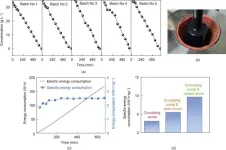(Press-News.org)
New research at the Roy Blunt NextGen Precision Health building has discovered a potential treatment for an underlying cause of cardiovascular disease in people with Type 2 diabetes.
More than 30 million Americans live with Type 2 diabetes. One common feature of diabetes is the hardening and inflexibility of blood vessels caused by damage to the endothelial cells in the vascular system. Over time, this can lead to the development and progression of cardiovascular disease, which is the number one cause of death in diabetics. Because endothelial dysfunction is causally linked to cardiovascular disease, there is a considerable need to identify new therapeutic targets to improve endothelial function in Type 2 diabetics.
A research team from the University of Missouri has found that neuraminidase activity is elevated in the circulation of Type 2 diabetic mice and humans. In a series of mechanistic experiments in cultured endothelial cells and isolated blood vessels, they were able to link increased neuraminidase to endothelial dysfunction.
“Because we know that Type 2 diabetics have this increased neuraminidase circulating in their blood, and that the presence of it promotes endothelial dysfunction, it is important to target it as a means of addressing the cardiovascular complications faced by those with Type 2 diabetes,” said Luis Martinez-Lemus, DVM, PhD, James O. Davis distinguished professor in cardiovascular research at the University of Missouri School of Medicine.
The team also found that neuraminidase inhibition using zanamivir, an oral inhalation drug used to treat the flu virus, improved endothelial function in diabetic mice.
“This research lays out the molecular mechanisms by which neuraminidase promotes endothelial dysfunction and these mechanisms can be exploited therapeutically,” said Jaume Padilla, PhD, an associate professor of nutrition and exercise physiology at MU. “Improving vascular function in people with Type 2 diabetes can help them live longer and better lives, which is why this research is so important.”
“Neuraminidase inhibition improves endothelial function in diabetic mice” and “Neuraminidase-induced externalization of phosphatidylserine activates ADAM17 and impairs insulin signaling in endothelial cells” were recently published in the American Journal of Physiology-Heart and Circulatory Physiology. In addition to Martinez-Lemus and Padilla, the research team at MU includes Camila Manrique-Acevedo, MD, distinguished professor in diabetes and director of faculty research at the School of Medicine; Larissa Ferreira-Santos, PhD, Thaysa Ghiarone, PhD and Francisco Ramirez-Perez, PhD, postdoctoral fellows at NextGen Precision Health; Christopher Foote, PhD, assistant research professor of medical pharmacology and physiology; James Smith, Marc Augenreich, Neil McMillan, and Gavin Power, doctoral students in Nutrition and Exercise Physiology; Andrew Wheeler, MD, surgeon, MU Health Care Weight Management Center; Katherine Burr, senior research specialist at the School of Medicine; Annayya Aroor, MD, assistant research professor at the School of Medicine; Shawn Bender, PhD, associate professor, College of Veterinary Medicine; Mariana Morales-Quinones, PhD, senior research specialist at NextGen Precision Health; Morgan Williams and Juan Gonzalez-Vallejo, NextGen Precision Health.
END
FOR IMMEDIATE RELEASE
Drugs that target a receptor on immune cells called activin receptor 1C may combat tumor-induced immune suppression and help patients’ immune systems fight back against cancer, according to a study by investigators at the Johns Hopkins Kimmel Cancer Center and its Bloomberg~Kimmel Institute for Cancer Immunotherapy.
The study, published online Jan. 8 in Oncoimmunology, identifies a new strategy cancer cells use to protect themselves from immune system attack, and suggests treatments that could counteract it. It shows that tumor cells and some immune cells produce proteins called activins that ...
Researchers have made significant progress in the development of artificial neural networks using tiny silicon devices called microresonators, paving the way for faster and more energy-efficient artificial intelligence systems. These networks mimic the computing capabilities of the human brain, breaking away from traditional digital computer architectures and leveraging the speed, low power dissipation and multi-wavelength capabilities of photonics.
A review article describing the implementations of neural networks using silicon microresonators was published Jan. 16 in Intelligent Computing, a Science Partner Journal.
Silicon microresonators ...
Scientists develop a simple blood test to quickly diagnose sarcoidosis
NIH-funded tool can accurately identify the potentially life-threatening inflammatory disease
A research project supported by the National Institutes of Health has developed a tool to rapidly and inexpensively diagnose sarcoidosis, a chronic inflammatory disease marked by the growth of tiny lumps called granulomas in the lungs and other organs in the body. The tool, which uses a simple blood test, could allow for selective use of more invasive diagnostic tests often used to identify the ...
A research team at Tsinghua University led by Professor Huijuan Liu has developed a new electrochemical system that promises to revolutionize metal recovery from industrial wastewater. The research was published in Engineering.
Industrial wastewater poses significant environmental hazards due to heavy metal pollution. Current methods for metal recovery, such as electrodeposition, suffer from interfacial ion transport limitations, resulting in slow and low-quality recovery. In their study, the team proposed a novel approach that integrates a transient electric field (TE) and swirling flow (SF) to improve mass transfer and promote interfacial ...
In a groundbreaking study, Professor Won-Jin Kwak in the School of Energy and Chemical Engineering at UNIST, in collaboration with researchers from Hanyang University, have pioneered a method to significantly enhance the performance and lifespan of organic electrode-based batteries. The findings promise to accelerate the commercialization of eco-friendly batteries and pave the way for further advancements in the field.
Organic electrodes have long been recognized for their cost-effectiveness and natural abundance, making them a promising alternative to traditional lithium-ion battery ...
BGI Europe A/S, a wholly owned subsidiary of BGI Genomics, announced its NIFTY® non-invasive prenatal testing kit and software (CE-IVDD List B) were granted an extension under its existing CE-IVDD certification to include the DNBSEQ-G99 model to meet the European Union regulations for medical devices.
In January 2024, BGI Genomics unveiled the NIFTY® ultra-fast non-invasive prenatal genetic testing product, utilizing the innovative DNBSEQ-G99 platform. Designed for both small and medium throughput, this platform ensures top-notch testing ...
Living in neighborhoods with high levels of violence can affect children’s development by changing the way that a part of the brain detects and responds to potential threats, potentially leading to poorer mental health and other negative outcomes, according to research published by the American Psychological Association.
However, nurturing parents can help protect kids against these detrimental effects, according to the study, published in the journal Developmental Psychology.
“Decades of research ...
A groundbreaking technology that can recognize human emotions in real time has been developed by Professor Jiyun Kim and his research team in the Department of Material Science and Engineering at UNIST. This innovative technology is poised to revolutionize various industries, including next-generation wearable systems that provide services based on emotions.
Understanding and accurately extracting emotional information has long been a challenge due to the abstract and ambiguous nature of human affects such as emotions, ...
HOUSTON ― The University of Texas MD Anderson Cancer Center today announced it has acquired certain assets from Bellicum Pharmaceuticals, Inc. related to the CaspaCIDe® switch platform and the GoCAR® platform. The transaction also includes clinical-grade stocks of rimiducid, an agent used to trigger the switches.
As a result of this acquisition, MD Anderson may incorporate these platforms into its own cell therapy programs. The institution also intends to make the technology ...
From Bangladesh to India to Texas, Tom Varner is leveraging his research to improve sources for drinking water around the world.
Varner, a UTSA doctoral student in environmental science and engineering, explored the mobility of arsenic from the sediments surrounding the Meghna River in Bangladesh as part of a National Science Foundation-funded project.
The river flows through central Bangladesh, where elevated concentrations of arsenic in the groundwater threaten the welfare of millions of people. Long-term exposure to arsenic, which is toxic when ingested, can lead ...




